I currently share my life with two Siberian Huskies – puppy Lara (7 months old) and Shania (3.5 years old). Both of them are very silly, and very energetic. They love to play, explore, and hunt for earth critters.
Siberian Huskies are beautiful dogs who love people and love life. They can be great family dogs if properly trained. However, because of their high energy and high prey drive, they require a lot of daily exercise and are not to be trusted off leash. When bored, a Husky may chew, dig, and escape to look for adventure elsewhere.
Before getting a Sibe puppy, find out all you can about the wonderful nature of Siberian Huskies – the good, the bad, and the quirky.
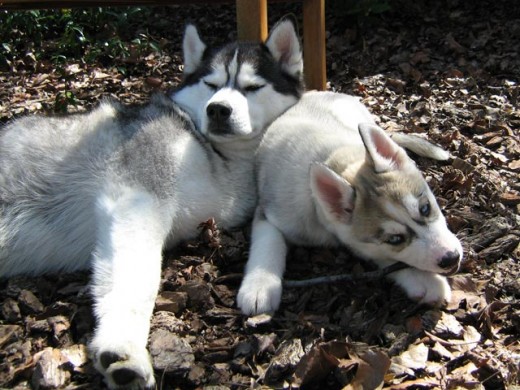
Siberian Huskies – The Good
1. Siberian Huskies are love bugs.
Sibes are very affectionate dogs. They are especially friendly with people, even strangers.
Husky Shania has very many friends in our neighborhood and she enjoys going to say hello to them every day. Her most favorite friend in the world is the Awesome Cookie Guy. Whenever we pass his house, Shania always stops and waits. When her Cookie friend spots her and comes out, he comes bearing gifts – a yummy low-fat cookie for Shania!
Shania also comes to me when I am sad or upset. She will lie down next to me or lay her head on my lap and give me licks.
The people trusting nature of Siberian Huskies make it easy to find caretakers for them when I get busy, or when I need to leave on emergencies or vacations.
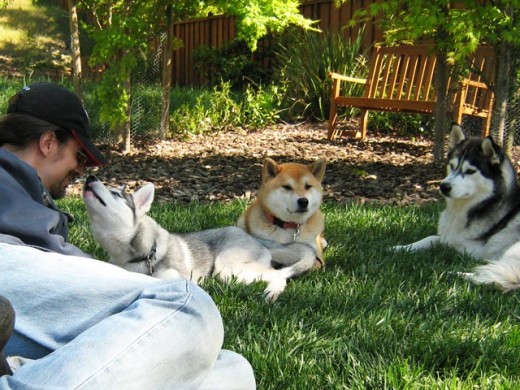
2. Siberian Huskies are athletic and have a strong zest for life.


Lara and Shania are frequently on the go. They enjoy re-landscaping our backyard, attacking bushes, pulling down trees, running, jumping, and digging. They both enjoy playing chasing games and are always ready to go out for a walk and explore. They get very excited whenever anybody comes to visit and enjoy spending play-time and rest-time with their pack.
As part of their zesty life program, Huskies also love to eat.
Both Lara and Shania will eat and eat and continue to eat more if they can. To keep them healthy and slim, I set up a fixed eating schedule and only give them their allotted amount of food. If I give them treats, then I reduce their regular meals a bit so that they keep a fairly constant caloric intake.
Sibes are not shy about stealing food or begging for food. Both Lara and Shania will steal each other’s food if they can. They will also steal from my other dog, Shiba Inu Sephy.
I always supervise them closely during meal-times. Food stealing can encourage food aggression, so I train my dogs not to steal and teach them that if there is any stealing, I will handle the situation.
Siberian Huskies can also get impatient about food and may get slightly overzealous when taking food out of your hand. Bite inhibition training is a must.
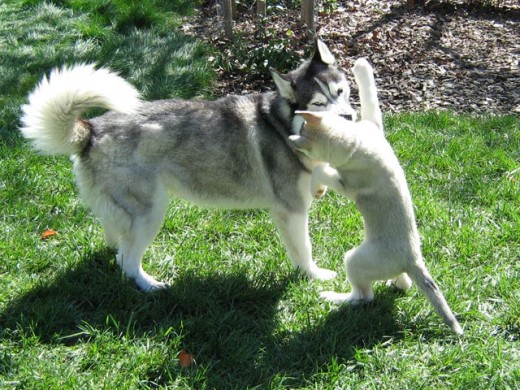
3. Siberian Huskies are clever and independent.
Reward Training
Sibes are smart and will quickly learn new commands and figure out interactive toy puzzles; especially when food is on the line.
Lara learned how to Sit on command as soon as we got her home (8 weeks old). In fact, if we use positive reinforcement techniques, we can start obedience training puppies as early as 6 weeks old. However, puppies should not be removed from the litter until they are at least 8 weeks old.
With clever and independent dogs like the Siberian Husky, it is most effective to use reward training techniques. I teach my Huskies that the best way to get what they want is to do what I want first. Here is more on how I trained my Husky puppy.
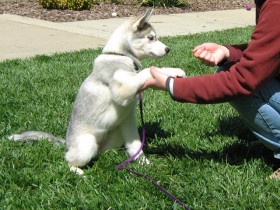
- If they want to go play in the backyard, they must first do a simple Sit next to the door.
- If they want their food toy, they must first do a Handshake.
- If they dig where they are not supposed to in the backyard then they lose their backyard privileges.
Since we control all of our dog’s resources, we can encourage good behaviors and discourage bad behaviors by tying those behaviors to our dog’s most desired resources.
With reward training my Sibes are always motivated to work. They are never hand-shy and love being with people. Siberian Huskies have a wonderful independent spirit, so we should not shock them, choke them, or physically dominate them into submission.

Siberian Huskies – The Bad
1. Siberian Huskies shed a whole lot.

Sibes blow their coat once or twice a year. During this time they will shed most of their undercoat and replace it with new fur. Frequent brushing will help to control some of this shedding and keep our Husky comfortable and clean.
Even though they may only blow their coat twice a year, Sibes actually shed all year round. There is Sibe fur everywhere in our house, including carpets, tile floor, counters, tables, chairs, blankets, and beds. Hair can also get onto kitchen utensils, food, and drinks.
Another issue to consider is pet allergies. Many people are allergic to dog or cat hair. Although Siberian Huskies have little doggy smell and are not one of the most allergy-causing breeds, a serious pet dander allergy of a family member should have you reconsidering a dog for your choice of pet.
~~[Siberian Husky Club of Canada]
Because they shed so much, try to make brushing and handling fun for your Husky. I always pair brushing sessions with food so that it becomes a fun and rewarding experience. I start with a soft brush and slowly switch over to using the Furminator which is awesome at getting out a dog’s undercoat.
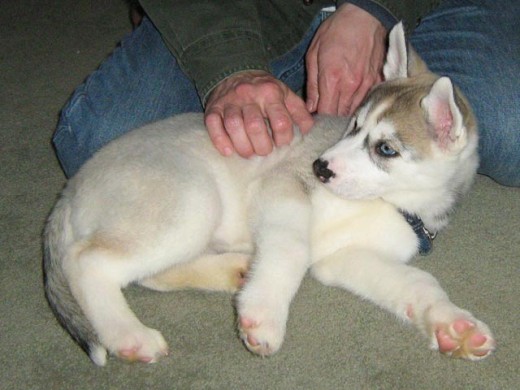
2. Siberian Huskies are awful guard dogs.

Sibes look wild, like wolves. For this reason, many people think that they make fierce guard dogs.
In truth, however, a Husky is more likely to invite strangers into your home with open paws and give them many licks.
Siberian Huskies are happy, goofy, and naturally trust all the people that they see.
My Siberians may sometimes make a fuss when people are at the door, but it is out of excitement rather than a warning cry.
Also, my Siberians will happily follow anyone home as long as they have some yummy pieces of food.
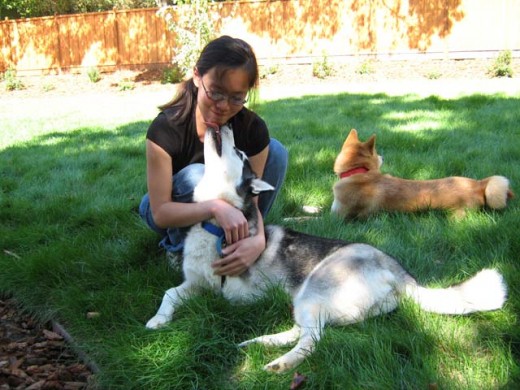
3. Siberian Huskies have very high prey drive.
Husky Shania is a very accomplished huntress.
When we first got our backyard landscaped, we had a big Earth Critter Attack. There are a fair number of rodents including gophers, voles, and mice that live in our area and they decided to throw a big party on our newly planted grass. Holes were appearing everywhere and the organic scent-based pest control we used did not seem to have much of an effect.
We were worried that our yard would not even last the year but then huntress Shania went into action. After a few days of hunting and marking, we noticed that the Rodent Gang had moved their party location somewhere else!
However, this high prey drive also makes it extremely risky to let a Sibe go off-leash in a non-enclosed space. If she spots a deer or squirrel, she will be gone and away before you can shout Stop. Siberian Huskies are very athletic and can cover large distances in a fairly short amount of time.
High prey drive also means that a Husky will have a strong instinct to chase and hunt cats and possibly also small dogs.

4. Siberian Huskies love to pull, pull, pull.


Sibes were bred to pull sleds, and today, they still love to PULL!
One of the biggest challenge with my Huskies is teaching them how to walk without pulling and/or to only pull on command.
The easiest way to leash train a Husky, is to start when she is young and still small. I have tried a variety of techniques with my dogs and what has worked best are the red-light,green-light technique and the 180-turn-around technique.
I started leash training puppy Lara almost as soon as we got her. First I trained her in our backyard. After she was fully vaccinated, I started leash training her around our neighborhood.
While leash training a Sibe, it is very important to be totally consistent. I stop as soon as puppy Lara starts to pull and if she pulls too much, I turn around and walk in the opposite direction. This teaches her that the fastest way to get to where she wants to go is to walk along with me at a measured pace.

5. Siberian Huskies love to sing.
Sibes have a great singing voice. However, neighbors may not particularly enjoy it when Siberians decide to sing or howl to the moon.
Husky Lara is a very vocal dog. She barks when excited, frustrated, scared, and sometimes when other dogs are barking. I have to spend more time and effort training her to stay quiet because her natural instinct is to vocalize.
Husky Shania is a more quiet dog. She almost never barks and the only time she vocalizes is when she is playing with my other dogs. She also sings beautifully when she hears a squeaky toy.
My Husky breeder tells me that there are some Sibe bloodlines that are more noisy than others. Lara’s mother, for example, comes from a more vocal bloodline.
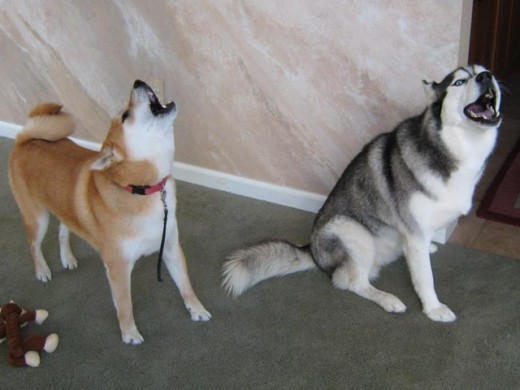
6. Siberian Huskies are a big time commitment.

Sibes are very energetic and affectionate. They like being with people and they also need something to do. Otherwise, they will get bored and get into at least 10 kinds of trouble.
All my dogs work for all of their food, either through obedience exercises, grooming sessions, play sessions, or through interactive food toys. In addition, they go for 1.5 hour daily walks and wrestle with each other several times a day. Sometimes, I join in on the fun and play flirt pole or the water hose game with them.
When bored or lonely, a Husky will figure out her own activities, which may lead to property damage or escape expeditions.
Do not get a dog, especially a Siberian Husky, unless you have a lot of free time to spend with her. If you must work long hours, consider dog daycare or hiring a dog walker. Sibes do best when there are many interesting activities throughout the day and frequent human supervision.

I Love Siberian Huskies
Sibes are awesome dogs. They are always ready of adventure, and they will be there to give you licks and support when you need it, or even when you don’t.
I got my Huskies through the breeder list from the Siberian Husky Club of America. I also considered adopting from my local Siberian Husky rescue, but did not find one that fit well with my Shiba Inu.
It is best to avoid backyard breeders, pet stores, and online pet stores. Such establishments almost always sell unhealthy puppies with poor temperaments.
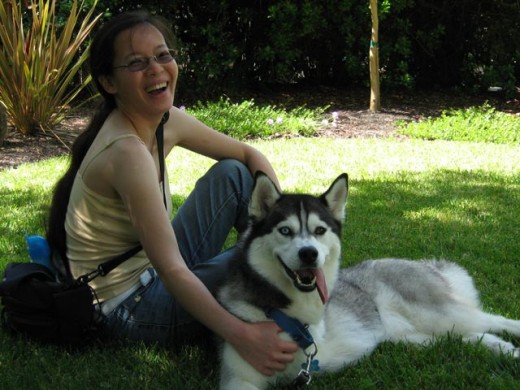
Source: Siberian Husky Pictures.
is it okay to bathe a husky after exercise?
How often would that be?
I make sure not to bathe my Husky too often because that may wash away essential oils and cause dry skin.
http://shibashake.com/dog/dog-bathing-how-to-bathe-a-dog-with-a-fun-game
hi i got my male husky 3 days ago and he used to live on 5th floor flat and he always used to go a toilet on there balcony. since living with us he urinates inside my flat even though i have the balcony door open for him. i always take him out for long walks about 4-5 times a day. can you give me some advise on this please??
husky 1 year 9 month old.
When I move homes with my dog, a potty training refresher course may sometimes be necessary. Dogs may not generalize potty training lessons from one place to the next. For example, my dogs are potty trained for my house, but they may still mark at the vet’s office or in dog class.
More on how I potty train my dogs.
When I get a new dog, I also take him to the vet for a check-up, so that I can be sure that everything is ok.
Hi my husky is now 4 months old and he does not like to sleep in his dog house even when it rains he prefers to sleep where there’s coverage but not in the dog house. LoL. Is that okay?
When it rains, I usually limit my Huskies’ outside time. One time, Shania developed a hot-spot from lying too long on a wet surface. Since then, I make sure to call them back in after a short time in the rain. I always reward them extremely well (with games, attention, food, and more) for coming inside when I call, so they are happy to do so. I also dry them with a towel (if necessary).
Hello i am having three months siberian husky puppy.her weight is 6 kg.what food i have to give her to increase her weight.please replay me
http://shibashake.com/dog/feeding-your-dog-a-healthy-diet
I have a 14 year old husky, who prefers the outside more then being inside. I have tried every dog house known to man and she prefers to sleep in the snow. I live in Indiana and it has been 9 degrees and less and still prefers to sleep in the snow. I have noticed that she eats every other day instead of 3 times a day. The vet said she is healthy, just 2 pounds under weight for her age. No diseases, and she still chases cats, catches mice in the snow, and even goes after the raccons and bunnies. I recently switched from pedigree to Blue Mountain which is more meat based, could that be an issue with her eating habits?
I adopted my husky from an abusive home 13 years ago, and she is friendly with me and my son and people around me, but everyone else she is a guard dog. She won’t allow anyone near the house that she does not know. Also not fond of any other breed of dogs except for other huskies and malamutes.
It could be. My younger Husky, Lara, is pretty picky about food. She will always eat boiled chicken, but she only eats her kibble (currently Wellness CORE) when she is hungry. I feed her twice in a day, but not too much each time, so that she always has an appetite and doesn’t eat too much in one sitting.
Also, if a Husky is getting a lot of mice and other prey, that is fresh meat that she probably prefers.
My Husky loves to stay out at night as well, because that is when there is most critter activity. She got sprayed by skunks a couple of times, and then got tapeworms, we think, from the mice. Now, I keep her inside at night. She gets to go out whenever she wants during the day, but if it is raining, then I limit her outside time.
Big hugs to your Husky girl! It is great that she has found such a good home. 😀
Please help. My male husky who just turned 3 started to eat my bushes this year. He has moved from my rose bush to peeling the bark off my rose of sharon (and it’s mid-winter). What do I do?
Some things that help with my Huskies –
1. More structured exercise. I take them on longer daily walks, play structured games with them, and do obedience training. The more energy they drain doing positive activities with me, the less likely they are to devise their own “games”.
2. Fence young trees and bushes. I fence up young trees so that my dog can’t get to them.
3. I supervised my dog closely when she is outside. If she goes for a tree, I no-mark and body block her away. Then I redirect her into doing something else. If she keeps going back for the tree, she loses her backyard privileges. Ultimately she learned that attacking trees is very unrewarding because it results in losing her outside freedom, so she stopped. For this to work, I had to be very consistent with supervision and follow-through.
Awesome site! AWESOME!!!! I have a 13 week old pretty husky named Bella. My wife and I were not prepared for her when we got her, we thought we were but we really werent. I have two questions to the forum. 1.) Sleeping arrangements. The first night we got her we were ignorant to the fact that she needed to sleep with a “pac”. She had 3 sisters, 1 brother, and her mom and we put her in a room by herself. Needless to say the next day we got a crate and put her in our room. When can we start to put her back into the other room? 2.) Potty training. She sleeps through the night with no problem and she for the most part will not pee in the house. Recently she has been peeing inside the house and yesterday pooped in the house. She goes outside as well. We are only feeding her 1 time a day around 2:00-2:30 when I come home and she wont use the bathroom for an hour to hour n half after we feed her. She would be feeding her more? The “breeder” was a friend and according to the post his way of training his dog is completely different from what most recommend.
1. Sleeping in a different room
It was different with both of my Huskies. Lara wanted to be out and about after a few months and Shania slept in our bedroom for many years, until I didn’t want her going up the stairs anymore. I like having my dogs in the bedroom, so I let them choose whether they want to stay in their crate in the bedroom, or be on the prowl downstairs.
Desensitization training can also help a dog become more comfortable with alone time. I usually start with very short periods of alone time (seconds), and then slowly build up from there.
http://shibashake.com/dog/the-siberian-husky-breed-good-bad/comment-page-3#comment-142501
2. Feeding and potty training
I fed my Husky puppy really often when she was young. Puppies need to eat more, and I found that it was better for her digestive system if I fed her smaller meals, more frequently. I was home with her the whole time, so I was able to take her out very frequently for potty breaks whenever she needed it.
More on how I potty trained my Husky puppy.
Big hugs to your pup! 😀
Question for your advice: We have a 6 month old Sibe named Juno. She is awesome. She gets crated once a day for about 60-90 minutes between when I get home from work and when my wife leaves. Juno sleeps upstairs in a crate at night in our bedroom and is quite content. She has just outgrown this 36″ crate upstairs, and we have another, 42″ crate. It is to big for the bedroom, and we had started leaving her old crate door open in the bedroom and she would usually just sleep on the floor.
We tried setting up the crate in the basement (the new crate) and she was left today for 2 hours and went CRAZY, destroyed her little sleeping mat, which was in her old crate. The basement is finished, tv was on, and she is comfortable in the basement as we often hang out with her down there.
How do I prevent her from being so upset being crated in the basement? She is SO good otherwise. When we get a dog walker in the future, we can’t have the walker getting Juno from the bedroom when we aren’t home – privacy and all. What do you suggest?
Thanks
Geoff
Geoff, how long did it take you guys to house break her?
One thing that seemed to help with my Shiba is to redo crate training for different places. For example, he was comfortable with sleeping in his crate at night in the bedroom. This was because we were there with him, so he felt safe. After doing this for a while, he got used to sleeping in his crate in the bedroom, even if we are not there. I think he has associated crate-in-bedroom with calmness and safety.
However, when I moved his crate somewhere else, it is a totally different situation for him, he got anxious, and could not settle.
What helped with Sephy is to redo crate training in the new place. I first start by throwing food into the crate and letting him go in and out on his own with the door open. I repeat this many times until he is comfortable with it. Then I may close the door for a few seconds, and then open it, and so on. In this way, I slowly got him used to time in his crate in the new place. In the beginning, I make sure I am there with him the whole time and that the experience is very positive.
Then once he is comfortable doing this, I use a similar process to slowly get him used to being alone in his crate in the new place. I start with very short periods of alone time in the beginning and slowly build up from there. More on how I did crate desensitization with my Shiba.
An article from SFSPCA on crate training-
http://www.sfspca.org/sites/default/files/crating_0.pdf
Big hugs to Juno and Happy Holidays! 😀
hi
just saw your site.. Loved it! need some advice desperately…
We live on a large estate with a forest touching our property. We have 4 dogs, the recent addition being our Siberian Husky who is now over 2 years old.
the dogs play all day long and go for long walks in the forest twice a day.. exercise and fresh air is plenty. we live up in the mountains in the Himalayas (India) so temperature wise its great for the husky..
the problem is that we have some goatherds from the nearby village that come in the forest to graze their cattle. Our husky “Indie” has attacked and killed nearly 5 goats till now (on seperate occasions). We have done everything possible to secure the property … chain link fences upto 6′ high, concrete block in the bottom .. etc etc.. we have even resigned to having him on a long leash all day.. even though neither my husband nor I like that!!!!
Someone suggested getting him neutered. Will that help?
We are extremely worried that the villagers might hurt him if he attacks their cattle again.. and are desperately looking at doing something to calm this dog..
he is extremely playful, friendly otherwise.. its only this aggression towards cattle.. which I know is natural for huskies but I am genuinely concerned about his safety.
Please help!
Sonali
How does he escape from the 6′ chain link with concrete blocks at the bottom? Is the property hilly? If so, a dog can go on the more elevated part, and then jump down. With my Husky, the first thing that I did was examine our fence perimeter closely, supervise her closely, and try to identify *how* she is escaping. Once I understand that, I can take steps to fix it.
When he goes for walks in the forest, is he on leash? Does he try to go for the cattle then?
For draining my Husky’s energy –
1. I make them work for all of their food through obedience exercises, interactive food toys, grooming sessions, etc.
2. I play structured games with them outside and inside the house.
3. They usually play with each other inside the house where I can supervise them and control their level of excitement.
4. During Lara’s escape phase, I observed her when she was outside, and if she started digging on the fence line, I would no-mark and stop her.
As I understand it, neutering can *sometimes* help to reduce roaming because a male dog will feel less of a need to go out and look for female dogs that are in-heat. Here is an ASPCA article that has good information on neutering.
However, both my Huskies have very high prey drive. If I let them, they will go after deer, cats, squirrels and more. When my Husky Lara escaped, she was going after an Earth critter, and dug her way out. In this case, the escape was due to her high prey drive. We also skipped her walk on that day, so she had energy to burn.
What helped with Lara was to increase the amount of supervised exercise, observe her outside time more closely, and identify her escape route, so that I could effectively block it.
I have actually seen a husky climb a chain link fence…May want to transition to another material.
Hi there I have a 6 month old alaskan malamute and I am having a hard time house training her. She pees and does her business outside fine and I praise her for it but between the hours of 11pm and 6am she is put to a room of her own with her plastic bed in it and overnight pees a puddle and most of the time poos aswell. She is let out every 2hrs from 6am til 11pm. I do not overfeed her or give too much water. She will pee in the house aswell occasionally too. I need some advice on how to stop this peeing overnight please feel free to email me with any advice at all. It will be appreciated.
Weewee pads work. That’s whati do with my4 month old Siberian husky
How long have you had her? Did this behavior start recently, or has she always done this? If the behavior just started recently, what changed during this time? Does she seem stressed when she is in the room by herself? Does she whine, scratch the door, or try to get out?
Sometimes, when there is frequent pooping and peeing, it could be from physical issues or from stress and anxiety (e.g. separation anxiety).
In terms of potty training, I learned from my Husky pups that supervision is key. I need to not only maximize successes, but also minimize mistakes. Every time I catch my puppy in the act and take her outside, she learns that going outside is the right thing to do, and going inside is not. Every time my puppy makes a mistake and I am not there to stop her, she slowly learns that it is ok to go in the house.
More on how I potty trained my Husky puppies.